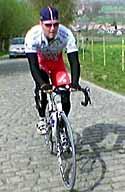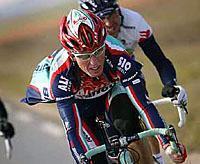
Recently on Cyclingnews.com |
An interview with Scott Sunderland, April 23, 2004
A well earned rest
Time off, more on Amstel '98, and riding with Alessio-Bianchi
Scott Sunderland Born: November 28, 1966 Career highlights2004 - Alessio-Bianchi 44th, Paris-Roubaix 2003 - Team fakta 2nd, CSC classic 2002 - Team fakta 1st, Stage 7, Bank Austria Tour 2001 - Team fakta 1st, GP Fourmies 2000 - Palmans-Ideal 2nd, Australian Championships (3rd in the race) 1999 - Palmans-Ideal 1st, KOM, Commonwealth Bank Cycle Classic 1998 - Palmans 1st, GP Nokere 1997 - Gan 1st sprint classification, Tour de Romandie 1996 - Lotto 1st, Stage 4, Tour des Regions Wallonnes 1995 - Lotto 4th, G.P. Jef Scherens 1994 - TVM 1st, Schynberg Rundfahrt 1993 - TVM Australian Cyclist of the Year 1992 - TVM 1st, Mazda Alpine Tour 1992 - TVM 1st, Tropheo Pantalica |
After a solid block of racing in the early part of the season, Cyclingnews diarist Scott Sunderland (Alessio-Bianchi) has earned himself a three week break from racing. Our Chief Online Editor Jeff Jones caught up with the Belgian-based Aussie pro just before he flew off to Spain for some time away from it all.
CN:You had a solid start to the season and did a great job for the team in the early classics. Why didn't you start in Amstel?
SS: After the high of the team winning Paris-Roubaix, it was kind of weird entering a three week period without competition. My heart wanted to keep racing, as my form was still on a high, but my head told me it made sense to have a rest. My team director Bruno Cenghialta confirmed that thought and said, "If you don't have a break now, you won't get one any more this season!"
Besides that, my wife Sabine was very anxious until the decision not to ride was made. She said the way I have been going reminds her of my strong start of the '98 season. Somehow I think Sabine hasn't forgotten it all as well as I have myself. Well, I guess, I'm not the one who saw my "eyes poking out of my head" because of the pressure the hematomas put on my brain.
Also, having been in hospital with my teammate Michael Skelde after his serious crash in Three Days of de Panne brought back those memories too vividly, Sabine was quite edgy after that. She was happy when his wife and parents arrived - Michael was doing a lot better already at that moment - but the time spent in intensive care with Michael really got to her. She was sort of happy to hear I wasn't starting in the race in which she saw me "fall on my head", as we refer to the crash nowadays.
CN: So does the crash still affect you mentally?
SS: Well actually, I don't like to talk about it any more. It's been six years now. I would like to be known in cycling because of my performances, not as "the guy who survived a serious accident".
But I realize that this will be connected to my resumé for good, and don't get me wrong: I am happy to receive mails and letters from people to whom I've been an inspiration, who have told me that my fight was also theirs to get back to a normal life. It's been my Prozac for the days I was down. It helped me as much as what my story helped them, I never needed other means to lift my spirit than their support.
Journo's keep asking me about it too, but I'd rather avoid the conversation about the "comeback" now, it sort of bores me to be honest.
CN: So what did you do during last week with your time off?
SS: With School Easter Holidays on it was an ideal opportunity to spend time with my family and do some sports with my oldest son Saën.

|
I kept rolling the legs, about three to four hours per day, even took time to do a few climbs with Matt, a friend visiting from Australia, but the afternoons were reserved for Saën's favourite hobbies: wall-climbing, squash and skate-boarding...and playing the PSII, so we gave that a good work-out too. Tristan (20 months) always wants to join in, which sometimes causes a bit of strife, but it was great fun to be with them.
CN:How have you found the start of the season?
SS: It's been great fun really. I enjoyed every race, rain or sun. The team winning in Roubaix was the icing on the cake for me. It was a great team effort. It's fantastic to feel the rush victory brings in such a big race, I love it! But the thing I enjoyed most is that people really seem to have appreciated seeing me up there in the races. My role within the team hasn't gone unnoticed. The reactions have been very positive.
CN:A number of cycling fans are wondering why you haven't been riding with a "bigger" team earlier?
SS: The answer to that question is quite complex. Again it refers to '98. See, told you I can't escape the subject!
One aspect is that after the accident, I wasn't sure if I wanted to have the job I have now until this season. I felt I just wasn't able to function 100 percent within a bigger team for a complete season the way I wanted too.
After Amstel '98, I had the possibility to work on my comeback at my own pace with Palmans. Those people were fantastic to work for and I am so grateful for their patience. At that time they were part of the small group within the sport who wanted to believe that I would make it back.
"I would like to be known in cycling because of my performances, not as 'the guy who survived a serious accident'."- Scott Sunderland doesn't want to dwell on the past |
CN: But why did you stay with the smaller Team fakta after your solid 2000 season?
SS: Same thing. With Team fakta, it was enjoyable to work with Kim Andersen as I could chose my program myself. Kim knew that even if I was healthy at that moment, if I told him I wasn't ready for a race, it was because of physical problems relating to the '98 accident. Kim knew I was doing the hard miles, that I was working at it like mad. When I told him "I will be ready for that race", he knew I wouldn't let the team down. But it took me a lot of work besides riding the bike to get there.
CN: And now you definitely seem ready for a team like Alessio-Bianchi?
SS: I think I've shown that so far. Although I always could peak for certain races in previous years, at the end of last season I felt that I started to have a perfect routine: A synchronised working of two schedules; the one on the bike and the one off. I have learned to feel my body in such a way that I can prevent my pelvis, lower back and neck playing up too much for me to be able to train and race.
I knew I was ready for a heavier program; that I would be able to manage it all. When I had the opportunity to sign up with Alessio-Bianchi, I knew it was the right time to take that step up again.
The daily "body-maintenance" routine has become a no-brainer and it's easier for me and my family to cope with. My times with physio's, osteo's, etc. are set and my Sabine handles the agenda so I only have to give her my training and racing schedule and she makes all the other appointments. She knows what has to be done, how much time I need for stretching, the complex treatment and so on.
CN: What about after cycling? Will this affect your daily life?

|
SS: We'll have to reassess things for sure once I stop my cycling career. I'm not sure how the body is going to react to it, but that's an issue I'll tackle in due time. Mentally I have always been strong - my willpower has never cracked so I'm pretty sure I'll be able to overcome that hurdle physically also.
The thing is, the work I have had to put in over the last six years has been so demanding and intense that not much else I undertake can possibly ask more dedication.
For now, I feel great on the bike. I'm enjoying the racing. Most important, I feel strong, as strong as I was in my early thirties. Unfortunately, while I was trying to fine-tune all aspects of my life after the accident, time didn't stop. I'm now 37 and it looks like I'm close to the end of my time as a pro athlete, but if things keep going smooth, I'll probably sign up for another year!
CN: No more Amstel '98 questions, promise. So, what's on the schedule for the coming two weeks, some more quality time at home?
SS: Ha, I wish. Actually, this week, I'm going down to Spain with a few mates to train in the sun. The weather here has turned crappy again, being Australian there's only that much I can cope with so we decided to go looking for some warmth and that means heading down south.
The last week of my break I'll be attending an Olympic Screening camp in Italy. I've been able to fit it into my training schedule nicely and it won't put too much stress on my preparation for the first races back: GP SATS and CSC classic in Denmark, (May 1 and 2)
CN: Thanks Scott. See you in May.
Other Talking Cycling Interviews

